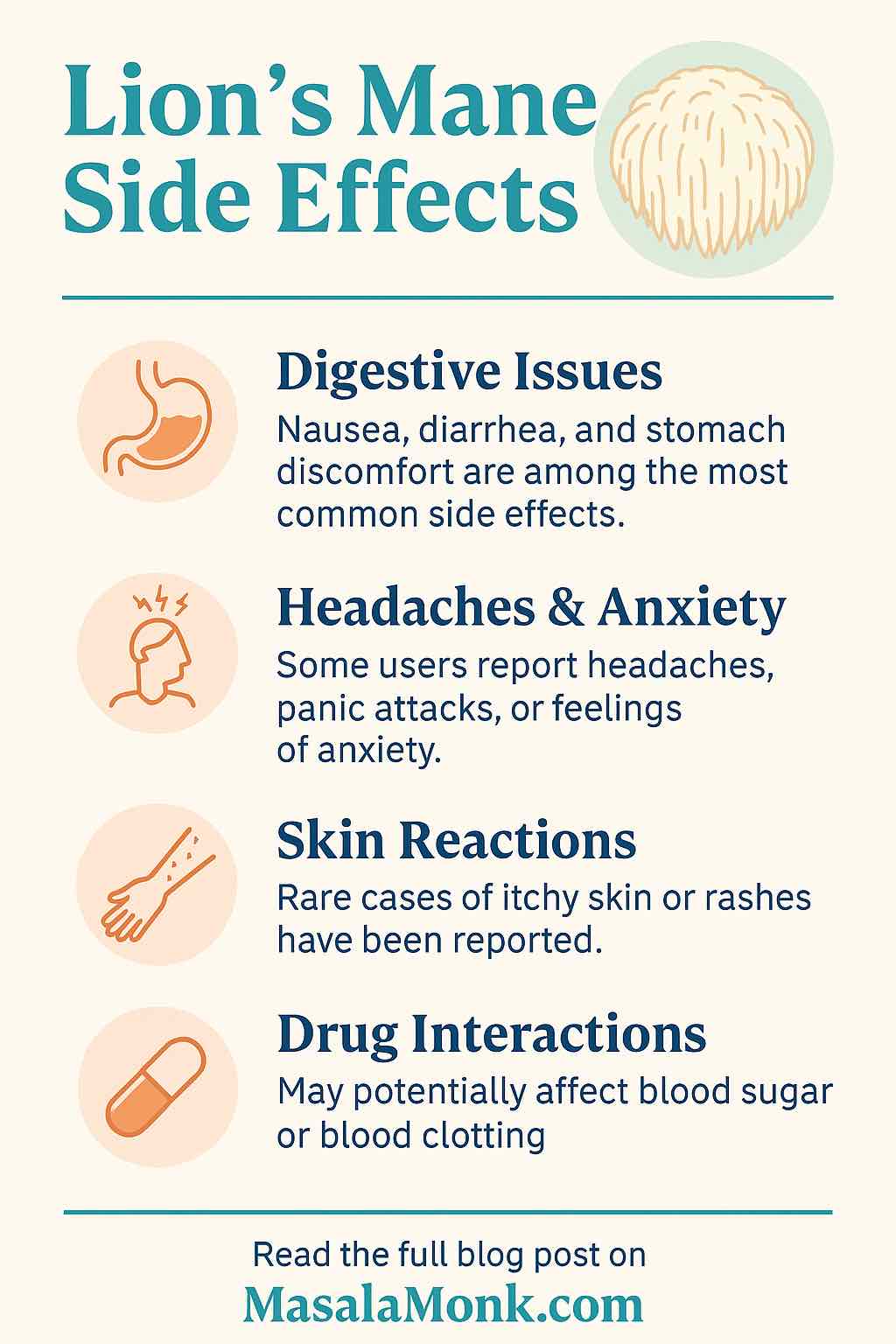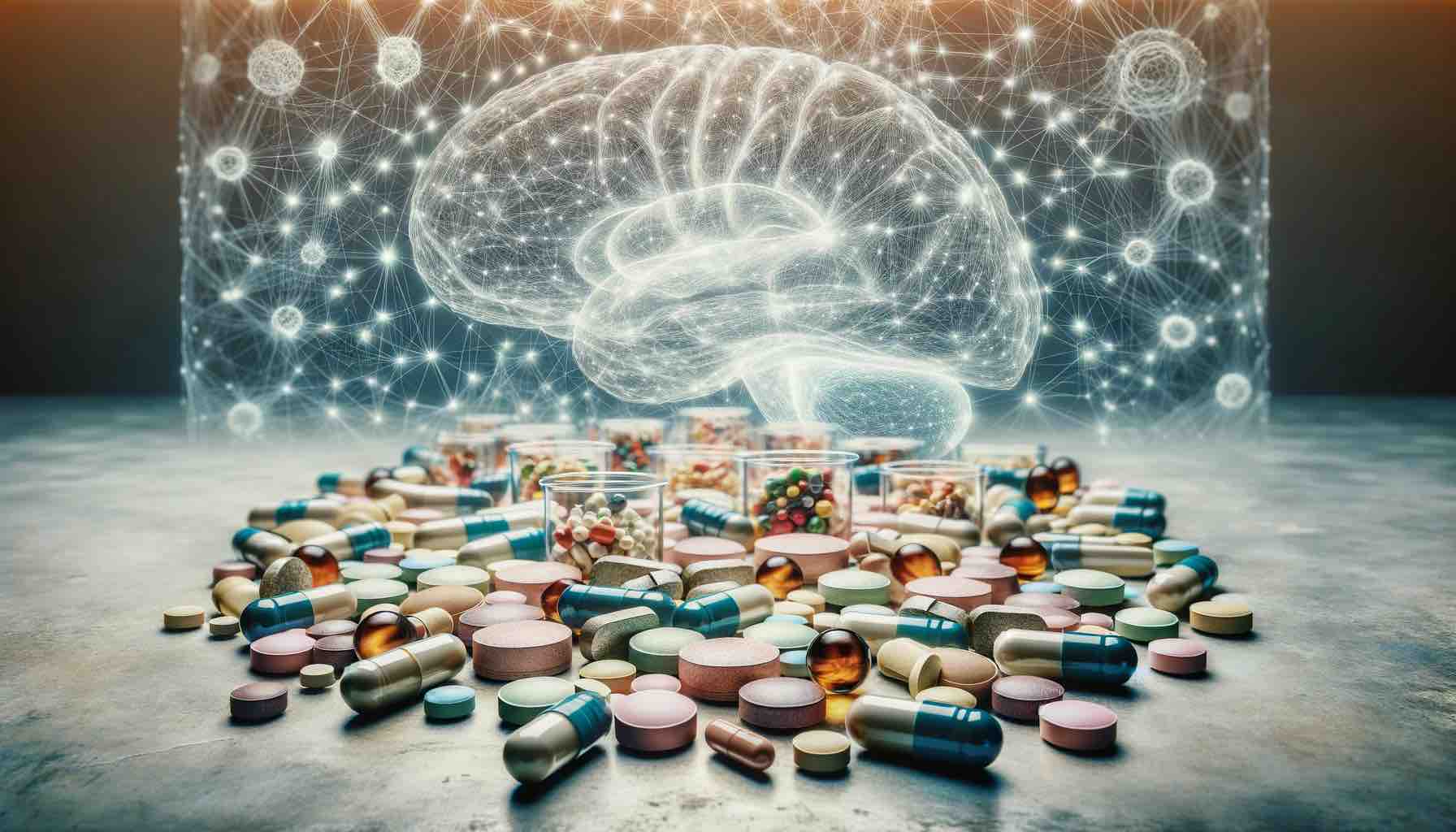
Lion’s Mane (Hericium erinaceus) has rapidly gained popularity for its reputed benefits on brain health, cognition, mood, and even nerve regeneration. But as interest surges, so do questions about its safety profile: Does Lion’s Mane have side effects? Are Lion’s Mane supplements safe? Can Lion’s Mane cause digestive issues, headaches, or anxiety? In this comprehensive guide, we’ll explore what both science and real users report about Lion’s Mane side effects.
What Is Lion’s Mane?
Lion’s Mane is a medicinal mushroom traditionally used in East Asian medicine. Its active compounds—including hericenones and erinacines—are believed to stimulate the growth of nerve growth factor (NGF), which plays a vital role in maintaining neurons. Modern research is investigating its potential for neuroprotection, cognitive enhancement, and mood stabilization.
Documented Side Effects in Scientific Studies
1. Gastrointestinal Disturbances
Clinical trials show that mild gastrointestinal issues are the most commonly reported side effects of Lion’s Mane supplementation. Symptoms may include:
- Nausea
- Diarrhea
- Abdominal discomfort
- Bloating
These effects typically occur in less than 10% of users and often resolve without discontinuation.
2. Allergic Reactions
Though rare, some individuals report allergic responses including:
- Skin rashes
- Itchy skin
- Respiratory distress (extremely rare)
These symptoms may result from mushroom sensitivities and should prompt immediate medical attention if severe.
3. Metabolic Considerations
Lion’s Mane has been shown to potentially lower blood sugar levels, making it necessary for diabetics or individuals on glucose-lowering medications to monitor their blood sugar closely.
4. Blood Clotting and Coagulation
Some animal studies suggest that Lion’s Mane may have mild anticoagulant properties. If you’re taking blood thinners or have clotting disorders, consult your healthcare provider before starting supplementation.
5. Pregnancy and Breastfeeding
Currently, there is insufficient research to guarantee safety for pregnant or breastfeeding individuals. Avoid use unless advised by a qualified healthcare professional.
Real User Experiences: Insights from the Community
While clinical studies offer controlled data, anecdotal reports provide a window into how Lion’s Mane affects people in everyday life. Let’s examine what users are saying on forums like Reddit, WebMD, and other platforms.
1. Digestive Issues: Beyond the Clinical Data
One WebMD user shared:
“After a few days, my mom puked and was bleeding from her colon while my sister had diarrhea.”
While severe digestive issues are rare, some individuals may experience significant GI upset, especially if starting at high doses or if sensitive to mushrooms.
2. Anxiety and Mood Changes
In forums like r/mycology, multiple users reported heightened anxiety and even panic attacks:
“Many users have been experiencing negative side effects such as panic attacks, severe anxiety, and depression after starting Lion’s Mane.”
These effects seem to be highly individual. Some users experience improved mood and reduced anxiety, while others report worsening symptoms.
3. Headaches and Cognitive Symptoms
On r/ADHDUK, one user noted:
“Upon taking it, I had a massive headache. Then one day I forgot to take it, and it was an absolutely awful day.”
Headaches may occur initially, possibly related to neurochemical changes. Some users also report withdrawal-like symptoms upon discontinuation.
4. Skin Reactions and Itchiness
A contributor to Gene Food shared:
“I experienced a brief racing feeling and itchy skin after a small dose via tincture.”
This suggests a possible histamine reaction in sensitive individuals.
5. Skeptical Perspectives
Not all users are convinced of Lion’s Mane’s benefits:
“Lion’s Mane supplementation is not going to give you any noticeable benefits outside of a lighter wallet.”
While some report transformative cognitive improvements, others experience no noticeable benefits.
The Science Behind the Side Effects
Lion’s Mane contains several bioactive compounds that influence the nervous system and immune function:
- Hericenones and Erinacines: Promote NGF production, potentially influencing mood, cognition, and neuroplasticity.
- Beta-glucans: Support immune modulation, but may also trigger allergic responses in sensitive individuals.
- Polysaccharides: Could influence gut flora and digestive processes, sometimes causing GI disturbances.
Who Should Be Cautious?
| Group | Reason for Caution |
|---|---|
| Pregnant/Breastfeeding | Insufficient research |
| Diabetics | Potential blood sugar effects |
| Blood Thinner Users | Possible anticoagulant effect |
| Allergy-Prone Individuals | Risk of allergic reaction |
| Individuals with Anxiety Disorders | Potential for mood disturbances |
🧩 Patterns & Considerations
| Side Effect | Nature | Frequency |
|---|---|---|
| GI upset (nausea, diarrhea) | Mild to severe (rare) | <10%, anecdotal outliers |
| Headaches/migraines | Occasionally reported | Single case in ADHD context |
| Anxiety/panic | Rare but possible | Reddit anecdotes |
| Skin itch/rash, histamine | Mild allergic reactions | Rare, environment-linked |
| Mood disturbances | Conflicting—both worsening and improving | Anecdotal |
How to Safely Use Lion’s Mane
1. Start Low and Go Slow
Begin with a small dose (e.g., 250-500 mg per day) and monitor how your body reacts. Gradually increase if well-tolerated.
2. Choose Reputable Brands
Select high-quality supplements that use fruiting body extracts rather than mycelium grown on grain. Look for third-party testing and transparent sourcing.
3. Monitor Symptoms
Keep a journal to track any side effects, mood changes, or digestive symptoms, especially during the first few weeks.
4. Consult a Healthcare Provider
If you have existing health conditions or take medications, always consult a healthcare professional before starting Lion’s Mane.
The Bottom Line
Lion’s Mane (Hericium erinaceus) is generally well-tolerated by most individuals and offers promising benefits for cognitive and neurological health. However, side effects can occur, ranging from mild digestive discomfort to rare allergic or mood-related issues.
The key is personalization: monitor your body’s responses, start with a low dose, and always prioritize quality when selecting a supplement. With informed use, many people find Lion’s Mane to be a valuable addition to their wellness regimen.
Disclaimer: This article is for informational purposes only and does not substitute for medical advice. Always consult a qualified healthcare professional before starting any new supplement.
Frequently Asked Questions (FAQs)
1. Does Lion’s Mane have side effects?
Yes, while generally well-tolerated, some users experience mild side effects like digestive upset (nausea, diarrhea, bloating), headaches, skin itchiness, and rarely, mood changes such as anxiety or panic. Severe reactions are uncommon but possible.
2. Can Lion’s Mane cause digestive issues?
Digestive disturbances are among the most frequently reported side effects. Symptoms may include stomach cramps, nausea, bloating, and diarrhea, especially when starting at high doses.
3. Can Lion’s Mane cause anxiety or panic attacks?
Although many people report improved mood and reduced anxiety, some users have experienced heightened anxiety, panic attacks, or mood disturbances. These effects seem highly individual and may depend on dosage and personal sensitivity.
4. Does Lion’s Mane cause headaches?
Some users report headaches, especially during the initial days of supplementation. This may be due to changes in neurochemical activity related to nerve growth factor stimulation.
5. Is Lion’s Mane safe during pregnancy or breastfeeding?
There is not enough scientific data to confirm its safety for pregnant or breastfeeding individuals. It’s best to avoid use during these periods unless approved by a healthcare professional.
6. Can Lion’s Mane affect blood sugar levels?
Yes. Lion’s Mane may lower blood sugar, so individuals on diabetes medication or those prone to hypoglycemia should monitor their blood sugar closely and consult a healthcare provider before use.
7. Does Lion’s Mane interact with medications?
Potential interactions exist with medications affecting blood sugar, blood clotting, or the immune system. Always consult a healthcare provider if you’re on prescription medications before starting Lion’s Mane.
8. How long does it take to see benefits from Lion’s Mane?
Some users report cognitive or mood benefits within days, while others may require several weeks of consistent use. Response time varies greatly between individuals.
9. What is the safest Lion’s Mane dosage to start with?
Begin with 250–500 mg daily to assess tolerance. If well-tolerated, the dose can be gradually increased based on product guidelines and individual goals.
10. How do I choose a high-quality Lion’s Mane supplement?
Look for products using fruiting body extracts (not just mycelium), with clear labeling, third-party testing, and certifications for purity and potency. Avoid unverified brands or products with proprietary blends lacking transparency.














